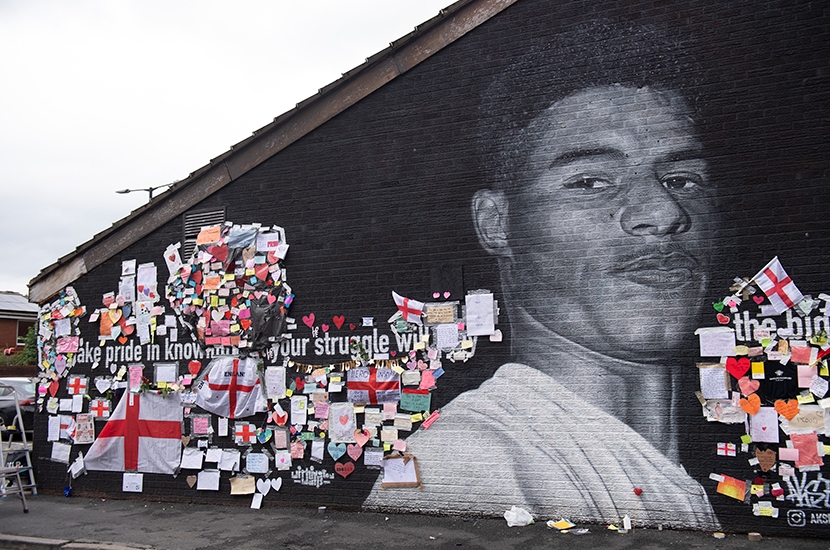There are two certainties whenever England’s football team plays; one that is long-established and the other a recent phenomenon. Players who never miss a penalty during training sessions will end up fluffing their attempts under the pressure of a shoot-out. And the post-match discussion of football will quickly move on to the issue of racism.
England’s first appearance in the final of a major tournament since the 1966 World Cup ought to have been a moment of national celebration. Indeed, that is how it seemed until the three missed penalties. Within hours, though, few seemed to be talking about anything other than the racist abuse directed at the three players who missed the target. Yet again, many asserted, here was proof that Britain is a country afflicted with systemic racism — a fact highlighted by the reaction to the match.
This country has embraced a national football team of very diverse backgrounds
Some of the tweets quoted in recent days are disgusting. But do they really justify the national neurosis which they have set off? One of the strange dynamics of social media is to serve up a freak show, to allow a handful of anonymous trolls to say hateful things which are then magnified by the outraged reaction. This gives a distorted view of the national debate, and obscures the success Britain has made in tackling racism.
Consider the number of offensive tweets involved. According to research by Channel 4 News, 2,000 offensive tweets were targeted at Marcus Rashford, Jadon Sancho, Bukayo Saka and Raheem Sterling (who did not take a penalty) — 167 of which were considered to be ‘high-risk’ abuse. Every single one is deplorable, but it is a small figure compared with the angry and rude tweets which constantly get flung back and forth on social media. If Britain’s population of racists has really been reduced to a couple of thousand out of 66 million people, that should be considered good news. Few other European nations would have so small a racist reaction in such circumstances — certainly not Sunday’s victors, Italy, where black players are regularly subjected to monkey chants.
What’s more, a large proportion of the offending tweets were posted under pseudonyms and should not be used as evidence for racism within Britain without further investigation. Following the Westminster Bridge attack in 2017, an anti-Muslim tweet was reproduced in many newspapers as an example of Islamophobia, before a team at the University of Edinburgh discovered that it originated in a bot factory in St Petersburg. It was an attempt, successful as it turned out, to stir up racial tensions within Britain. Already there are signs that some of the abuse directed at England’s players originated from foreign accounts. Indeed, the Centre for Countering Digital Hate identified 105 Instagram accounts which directed racial abuse at Rashford, Saka and Sancho. Of these, 59 were based outside the UK and just five were definitely from within the UK. The rest could not be identified.
The bigger picture is that this country has embraced a national football team of very diverse backgrounds. Players have been cheered when they won and supported after they failed at the last hurdle. This is especially true of the players who missed their penalties. It took only hours for residents of Rashford’s native Manchester to cover a defaced mural with messages of support.
As for booing the knee-taking, it is wrong to make out that it is a sign of fans condoning racism. The England players and their manager might believe that in taking the knee they are making a straightforward protest against racism. To others, the gesture is the signature of the highly politicised Black Lives Matter movement and represents the unwelcome introduction of politics into a sporting arena. The ‘Kick It Out’ initiative against racism in football was supported by fans all over the country.
The obsession with culture wars and racism has buried coverage of a no less serious incident from Sunday’s final: the riotous behaviour of ticketless fans who stormed barriers, endangering others in the process. The father of the defender Harry Maguire was even left with suspected broken ribs after being crushed by those who broke in. The inability of security staff to contain the situation could cost Britain its joint application — with Ireland — to host the 2030 World Cup. That would be a shame because, at its best, Britain is as good as any nation at demonstrating how a harmonious multiracial society can work. The 2012 Olympics, too, showed how well we can organise large sporting events with enthusiastic support.
It is right to condemn the racist tweets which followed defeat in the Euros final. It is quite wrong to obsess over them or to make out that they show Britain has an un-usual problem with racism. On the contrary, the real story to have emerged from these championships is how at ease the vast majority of the population is with the issue of race. We might not be perfect, but Britain is vastly less racist than it was a generation or two ago and stands as an example to many other countries.






Comments